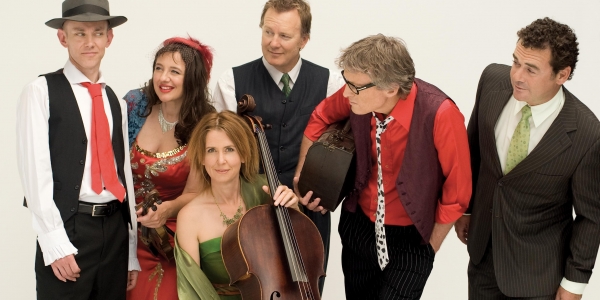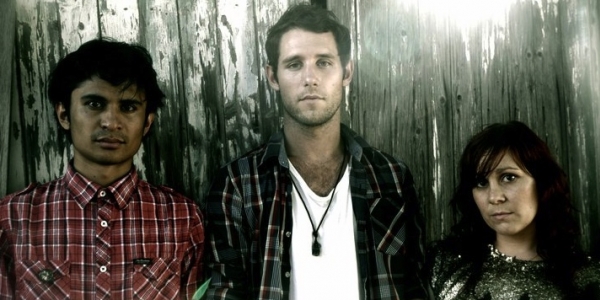“I have a low boredom threshold, but also being a musician in Australia, I think you have to multitask a little bit,” he begins. “Doing my soundtrack and production stuff is really important to me considering My Friend The Chocolate Cake is an all-acoustic outfit. Doing those other things mean I get to play around with the resonator button and synthesisers a bit which can be just as much fun.”
Having long worked world music into Not Drowning Waving’s records, Bridie’s solo albums feature subtle electronic compositions. “I’ve got pretty diverse tastes is all,” he shrugs. “I think keeping in touch with the broadest range of music I can helps me become a more interesting musician.”
MFTCC began in 1989 while Bridie and co-founder, cellist Helen Mountfort, were on holiday in New Zealand and having a break from commitments to Not Drowning Waving. There they wrote a set of acoustic-based songs, clearly in oppose to all previous NDW material which would ultimately form the start a steady side-project.
“Not Drowning Waving was my first passion and they were a great bunch of musicians, but we had a much different agenda in what we were trying to do than what we do in ‘Cake,” Bridie surmises. “But with my solo records I get to satisfy a lot of the urges I had doing NDW, but with MFTCC I get to have that collaborative, social urge fed as well.”
Not Drowning Waving, you could argue, fit awkwardly within the Australian music landscape of the mid-to-late ‘80s. Their lean towards world music and sparse instrumentals probably kept them from reaching the broader audience MFTCC has. Indeed by the time MFTCC had released their second album, Brood in 1995, they were gathering ARIA’s and landing on radio playlists.“MFTCC was a priority for me from very early on,” Bridie adds on transitioning between bands the first time.
“It was always going to be fascinating to see where we could take this idea of an acoustic chamber band with our kind of opposing views on music.”
Wearing their boffin hats, production on the band’s sixth studio album Fiasco was – as has been the case on all MFTCC albums – Bridie and Mountfort with mixing by Tim Cole. Bridie describes his relief as the final piece was added to the long-awaited new ‘Cake album.“I remember on the last night (of mixing) sitting with Tim Cole and realising with some satisfaction we really had done the best album we could.
“Over time we’ve developed a kind of ‘Cake sound’, and when I hear that, I know it’s a good indication that we’re clicking.”
Aside from the predominant duelling strings, another constant in MFTCC is the suburban landscape oil paintings and collages that adorn most of their record sleeves. Fiasco’s cover feels a little familiar, and then it dawns that this street scenario had graced the cover of Brood – only now the developers have been through. “Warwick Jolly’s done most of our album artwork so far and, like the music, the more you look at his collages the more you find.” Indeed you’ll see a train track tearing up the middle of the image, surrounded by cut-outs of Melbourne buildings and people past and present. In the centre, sits the unmistakable red brick overpass on the way to East Richmond station – an often by-passed location for metro travellers – which forms a tidy subtext for an album concerned mostly with journeys big and small and those who get left behind. “I guess the metaphor is fairly obvious isn’t it?” Bridie laughs.
It seems a natural choice of words considering the album’s centrepiece, Madang Panic Attack. This uncharacteristic, somewhat guttural release from the band – written by Bridie in Papua New Guinea – is one of the few tracks Bridie will admit to being a very personal one.“Madang Panic Attack was me going through a break-up and being in a different, quite volatile country with a bottle of duty-free whiskey.”
“Anyway, my troubles got on top of me one night and I spewed forth all these lyrics trying to make sense of everything.”
Further hints of personal losses lurk throughout the album, but none is more startling than on Black Ice. “It was more to do with childhood memories of being driven on these winding mountain roads and seeing black ice warning signs. To me they always seemed to imply life’s greatest dangers are the ones unseen, which is just one of those things that has stayed with me through life.” Changing tact, David adds as our time runs out, a surprising annoyance to him, “I’m actually really pissed off AC/DC called their last tour ‘Black Ice’ because now we can’t use it for ours,” he laughs. “They kind of pre-emptively stole our thunder there… those bastards!”







